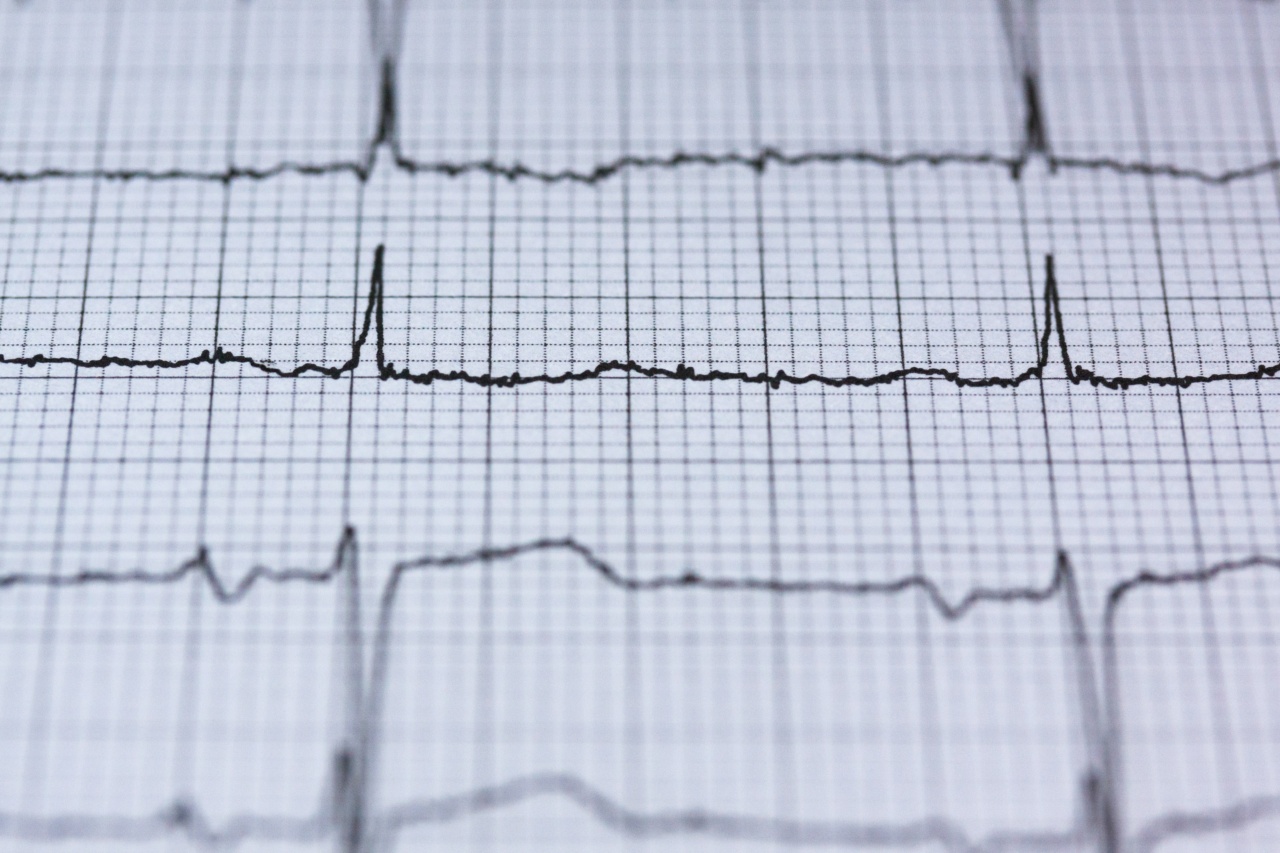Our hearts are essential organs that pump blood to the rest of the body. However, there are instances when the heart may not beat regularly, resulting in irregular heart rhythms.
Irregular heart rhythms are not always a cause for concern, but they can sometimes be a warning sign of a more serious medical condition.
What is an Irregular Heart Rhythm?
An irregular heart rhythm is a disturbance in the normal beating pattern of the heart. The heart has a natural pacemaker, known as the sinoatrial node, which generates electrical impulses.
These electrical impulses travel through the heart, causing it to contract and pump blood throughout the body.
There are several types of irregular heart rhythms, including:.
- Atrial fibrillation – This is the most common type of irregular heart rhythm. In atrial fibrillation, the upper chambers of the heart, known as the atria, quiver instead of contracting effectively.
- Ventricular tachycardia – This is a fast heart rhythm that originates in the lower chambers of the heart, known as the ventricles.
- Ventricular fibrillation – This is a chaotic, irregular heart rhythm that can lead to sudden cardiac arrest.
- Atrial flutter – In atrial flutter, the atria beat rapidly but in a regular pattern.
- Bradycardia – This is a slow heart rhythm, usually under 60 beats per minute.
It is normal for the heart to occasionally beat irregularly, especially during exercise or periods of stress. However, if the heart beats irregularly for prolonged periods or is accompanied by other symptoms, medical attention may be necessary.
What Causes Irregular Heart Rhythms?
There are several factors that can contribute to the development of irregular heart rhythms, including:.
- Heart disease – Irregular heart rhythms are often associated with underlying heart conditions, such as coronary artery disease, heart valve problems, or a previous heart attack.
- High blood pressure – High blood pressure can damage the arteries and cause the heart to work harder, increasing the risk of irregular heart rhythms.
- Stress – Stress and anxiety can cause the heart to beat faster and irregularly.
- Caffeine and alcohol – Caffeine and alcohol can stimulate the heart and cause it to beat irregularly in some people.
- Electrolyte imbalances – Electrolytes, such as potassium and calcium, are essential for proper heart function. Imbalances in these minerals can lead to irregular heart rhythms.
- Drug use – Certain drugs, such as amphetamines and cocaine, can cause irregular heart rhythms.
Symptoms of Irregular Heart Rhythms
Irregular heart rhythms can produce a range of symptoms, including:.
- Palpitations – These are sensations of a racing, pounding, or fluttering heart.
- Dizziness
- Fainting
- Shortness of breath
- Chest pain
- Fatigue
It is important to note that not everyone with an irregular heart rhythm will experience symptoms.
Diagnosing Irregular Heart Rhythms
If you suspect that you have an irregular heart rhythm, it is important to seek medical attention. A doctor can diagnose an irregular heart rhythm using a variety of tools, including:.
- Electrocardiogram (ECG) – This test checks the electrical activity of the heart to detect irregular heart rhythms.
- Echocardiogram – This test uses sound waves to create images of the heart and its structures.
- Holter monitor – This is a portable device that records your heart’s activity over a 24-hour period.
If your doctor diagnoses an irregular heart rhythm, they may recommend further testing to determine the underlying cause.
Treatment for Irregular Heart Rhythms
The treatment for irregular heart rhythms will depend on the underlying cause and the severity of your symptoms. In some cases, no treatment may be necessary.
However, if the irregular heart rhythm is causing symptoms or putting you at risk for complications, treatment may be necessary.
Treatment options for irregular heart rhythms may include:.
- Medications – There are several types of medications that can help regulate the heart rhythm, including beta-blockers, calcium channel blockers, and anti-arrhythmics.
- Cardioversion – This is a procedure that uses electrical shocks to restore a regular heart rhythm.
- Ablation – This is a procedure that uses heat or cold to destroy the areas of the heart that are causing the irregular heart rhythm.
- Pacemaker – A pacemaker is a device that is implanted under the skin and uses electrical impulses to regulate the heart rhythm.
Your doctor will work with you to determine the best treatment plan for your individual needs.
When to Seek Medical Attention
If you are experiencing symptoms of an irregular heart rhythm, it is important to seek medical attention. While not all irregular heart rhythms are life-threatening, some can be indicative of a more serious underlying condition.
You should seek immediate medical attention if:.
- You experience sudden chest pain or discomfort.
- You have difficulty breathing.
- You feel faint or dizzy.
- Your heart rate is very low or very high.
- You experience a sudden loss of consciousness.
It is also important to contact your doctor if you are experiencing ongoing symptoms of an irregular heart rhythm. Your doctor can work with you to diagnose the underlying cause and develop a treatment plan.
Preventing Irregular Heart Rhythms
While some causes of irregular heart rhythms, such as underlying heart conditions, cannot be prevented, there are several steps you can take to reduce your risk of developing an irregular heart rhythm, including:.
- Maintaining a healthy weight
- Exercising regularly
- Eating a healthy and balanced diet
- Managing stress and anxiety
- Avoiding excessive caffeine and alcohol consumption
- Quitting smoking
By prioritizing a healthy lifestyle, you can help reduce your risk of developing irregular heart rhythms.
Conclusion
Irregular heart rhythms are a common occurrence that can be indicative of a more serious underlying condition. If you are experiencing symptoms of an irregular heart rhythm, it is important to seek medical attention.
Your doctor can diagnose the underlying cause and develop a treatment plan that is right for you. By taking steps to live a healthy lifestyle, you can help reduce your risk of developing irregular heart rhythms.






























